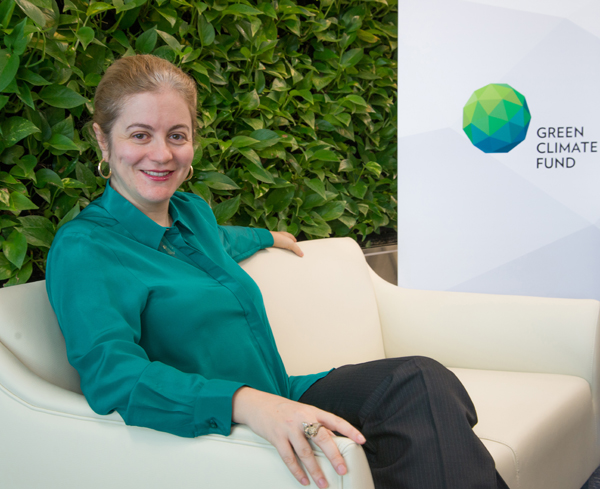Campaigners have urged the UN’s Green Climate Fund to reject the involvement of HSBC and Credit Agricole, ahead of COP21.

A group of 88 NGOs, charities and academic bodies has penned an open letter to the board of the GCF, claiming that the accreditation of the two banks, which is currently being considered, would “pose serious reputational and moral risk to the GCF”.
Accreditation allows an institution to receive and distribute money on behalf of the GCF. In July, Deutsche Bank came under similar fire from NGOs after it was accredited by the fund.
“The banks’ accreditation would undermine the GCF’s commitment to robust fiduciary standards and strong environmental and social safeguards… and would be contrary to what the GCF Secretariat has described as having ‘GCF standards [that] build on best practices of global institutions'”, said the letter, which was signed by Friends of the Earth, ActionAid US and BankTrack Netherlands, among others.
According to the group, the two banks rank among the top 20 private banks to finance coal. Credit Agricole invested more than €7 billion in the coal sector between 2005 and 2014, while for HSBC this figure was more than €7.9 billion.
“Both banks also back non-fossil-fuel-based sectors with a large negative impact on climate. HSBC is a major financier of Indonesia’s palm oil sector, a sector characterised by driving deforestation on a vast scale, industrial agricultural excess, degradation of carbon-rich peatlands, human rights abuse, and labor exploitation,” it said.
“Accredited entities should have exemplary policies and practices in place to adequately deal with potential social, gender equality, environmental, and human rights risks of the projects they finance. This is not the case with HSBC and Crédit Agricole,” it continued, adding that HSBC has been accused of “bankrolling” logging companies in Malaysia.
The letter did not propose an alternative bank that would be deemed more suitable to receive and distribute the funds of the GCF. A spokesperson for Friends of the Earth, which led the campaign, told Environmental Finance that no “international banks should have direct access to GCF funds”.
HSBC and Credit Agricole did not respond to requests for comment ahead of publication.
Signatories to the open letter:
350.org (International), ActionAid USA, AFREMO Ladies Club (Ghana), Africa Emancipation Movement (Ghana), Alyansa Tigil Mina (Alliance Against Mining-Philippines), Aotearoa New Zealand Human Rights Lawyers Association, Asia Pacific Forum on Women, Law and Development, Asia Pacific Movement on Debt and Development, BankTrack (Netherlands), Both ENDS (Netherlands), CAFOD (UK), Center for Earth Jurisprudence, Barry University Law School (USA), Center for Environment/Friends of the Earth Bosnia and Herzegovina, Center for International Environmental Law (USA), Centre for Social Impact Studies (Ghana), CHANGE (Vietnam), Chennai Solidarity Group (India), CLEAN (Coastal Livelihood and Environmental Action Network) (Bangladesh), Climate & Sustainable Development Network of Nigeria (CSDevNet), Coast Rights Forum (Kenya), Community Resource and Development Center (Kenya), Consumers Protection Association (Lesotho), Corporate Accountability International (USA), Corporate Europe Observatory (Belgium), ECASARD (Ghana), Energy Action Coalition (USA), Environmental Justice Initiative for Haiti (USA), Equator Network (USA), European Association of Geographers (Belgium), Food & Water Watch (USA), Forest Peoples Programme (UK), Friends Committee on National Legislation (USA), Friends of the Earth England, Wales and Northern Ireland, Friends of the Earth International, Friends of the Earth U.S., Foundation HELP (Tanzania), Gender Action (USA), Germanwatch, Global Alliance for Incinerator Alternatives (International), Global Witness (UK), groundWork/Friends of the Earth South Africa, Heinrich Boell Stiftung North America, Human Rights Foundation Aotearoa (New Zealand), Indian Social Action Forum, Indian Youth Climate Network and Institute for Agriculture and Trade Policy (USA).
Others are: Institute for Climate and Sustainable Cities (Philippines), Institute for Policy Studies – Climate Policy Program (USA), Interamerican Association for Environmental Defense, AIDA (Latin America), International-Lawyers.org (Switzerland), JA!Justica Ambiental/FOE Mozambique, JVE International (Togo), JVE Zambia, Kenya County Government Workers Union, Khazer Ecological and Cultural NGO (Armenia), Klima ohne Grenzen (Germany), Korea Federation for Environmental Movements (South Korea), KyotoUSA, Labour, Health and Human Rights Development Centre (Nigeria), LEADS Nigeria, Leave It in the Ground Initiative, Les Amis de la Terre France, London Mining Network (UK), Maryknoll Office for Global Concerns (USA), MPIDO (Kenya), Nature Code – Centre of Development & Environment (Belgium), NOAH – Friends of the Earth Denmark, Nostromo Research (UK), P3 Foundation (New Zealand), Pacific Partnerships on Gender, Climate Change & Sustainable Development, PPGCCSD (Fiji), Pan African Climate Justice Alliance, PACJA (Africa), Policy Analysis and Research Institute of Lesotho, SAGRC (South Africa), SONIA for a Just New World (Italy), Southern Oregon Climate Action Now (USA), SustainUS (USA), Taiwan Environmental Protection Union, Tebtebba (International), The Development Institute (Ghana), The Institute for Policy Interaction (Malawi), Third World Network (Malaysia), Tipping Point Collective, (International), Universidad Nacional Autonoma de Mexico, Urgewald (Germany), WomanHealth (Philippines), WoMIn African Gender and Extractives Alliance (South Africa), Worldview-The Gambia, and ZIMCODD (Zimbabwe).
By Sophie Robinson-Tillett
